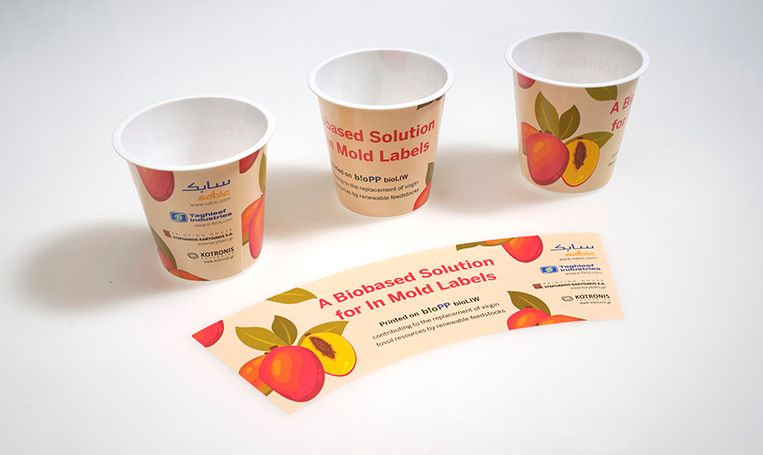Sabic and partners introduce first in-mold labeling solution with certified renewable polymers for food packaging containers.
SABIC, a prominent global player in the chemical industry, has formed partnerships with three experts specializing in in-mold labeling (IML). Together, they aim to showcase the utilization of certified renewable polypropylene (PP) resins in the production of high-quality mono-PP thin-wall container packaging, all without compromising on quality, ease of processing, safety, or convenience.
This cutting-edge single-step IML technology accomplishes seamless decoration of the part directly within the injection mold, seamlessly integrating the label into the packaging itself. By utilizing specific label film varieties and advanced high-definition printing techniques, this solution proves to be both aesthetically appealing and cost-effective.
Moreover, by employing certified renewable PP resins for both the molded parts and the label film, the resulting packaging can be recycled within existing rigid PP recycling systems.
Abdullah Al-Otaibi, General Manager, ETP & Market Solutions at SABIC, says: “The demand for in-mold labeled packaging is constantly growing across various different consumer market segments, as it provides major opportunities for cost effective and highly sustainable solutions.
Together with the responsibly sourced and certified renewable polymers from our TRUCIRCLE™ portfolio, this flexible decoration technology has enormous potential in fully recyclable mono-material packaging with no compromise on shelf visibility and consumer appeal in the retail space.
At the same time, it can help manufacturers and brand owners reduce their environmental impact and carbon footprint while addressing the need for preventing valuable used plastic from ending up as waste.”
The label material for the IML containers is a biaxially oriented polyethylene (BOPP) film produced by Taghleef, a leading global supplier of films solutions to customers worldwide, using a SABIC® certified renewable resin tailored to the BOPP process.
BOPP films are widely used for in-mold labeled injection molding applications in food, dairy and beverages, home, beauty and personal care packaging. Taghleef offers transparent, white and metalized PP label films, which can all be produced using polymers with bio-based feedstock.

Furthermore, they can easily be customized to meet specific needs of gravure or offset printing for desired haptic textures and visual appearance, from glossy, matt, orange peel or velvet feel to an entirely non-label look.
Monica Battistella, Sustainability Manager at Taghleef, adds: “Our BOPP film range for in-mold-labeling gives brand owners a wide choice of premium packaging finishes to enhance brand differentiation and shelf visibility with a low environmental impact.
In combination with the sustainable nature of SABIC’s mass balance certified renewable polymer from second-generation feedstock, the exceptional printability, die-cutting, anti-static and non-stick properties of these films deliver maximum value throughout the entire life cycle of the labeled products, including end-of-life recycling.”
As part of the present collaboration, the final BOPP label film is supplied to Karydakis, a leading specialist in optimized printing techniques, ink formulations and conversion technologies tailored to PP-based in-mold labels. The company’s sophisticated process delivers high-quality labels pre-printed with captivating designs and branding elements to match end customer specifications and ensure the effortless integration with the containers throughout the molding process.
Giorgos Karydakis, General Manager at Karydakis IML S.A., states: “With this collaborative initiative, we are demonstrating the feasibility of bio-based materials in the production of high-quality IML labels. We offer our customers a wide range of attractive printing options for cups, tubs, jars, shakers and pails in sizes from 50 ml to 50 liters, including additional digital watermarking with material information in line with the European HolyGrail 2.0 initiative for smart automated mechanical recycling.”
Augustinos Kotronis, General Manager at Kotronis Packaging, explains: “In-mold labeling offers substantial productivity benefits, since it eliminates the need for separately applied adhesive labels on the finished packaging product by forming a permanent, tamper proof bond with the container right in the mold.
In addition, the renewable container material from SABIC complies with all relevant international standards for food-contact applications, while showing excellent processability on our machines, including high flowability for reduced wall thicknesses. Moreover, it meets with our targets for reducing both CO2 emissions and fossil consumption.”
The IML labels, tailored for stacking purposes, are ultimately delivered to Kotronis, a medium-sized family-run company with expertise in manufacturing injection molded containers for food products. At Kotronis, these labels play a crucial role in streamlining the in-mold labeling of cups and tubs through a seamlessly integrated and fully automated single-step process, ensuring efficiency and precision.
Note: Content may be edited for style and length.




